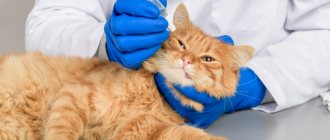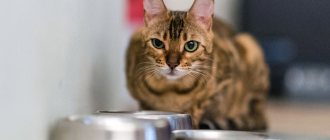Eggs are a valuable product containing many nutrients, amino acids and proteins. Including eggs in your cat's diet will bring significant benefits to her body. Is it possible to give your pet raw or boiled eggs and how often? Cats are carnivores and therefore require large amounts of protein food. However, when feeding your pet exclusively meat, digestive system disorders cannot be ruled out, threatening the development of chronic liver diseases. In this connection, the animal’s diet requires a variety of high-quality proteins.
Eggs are a source of protein comparable to meat and fish. The protein they contain is rich in lysine, an amino acid necessary to maintain cat health.
The benefits of eggs for a cat's body
Chicken and quail eggs have a beneficial effect on the condition of your pet's coat and strengthen the immune system. Moreover, including eggs in the diet will prolong the cat's youth, ensuring the prevention of heart disease.
The product is rich in vitamins and minerals responsible for the health of the pet’s nervous system and joints:
- phosphorus;
- iron;
- magnesium;
- calcium;
- potassium.
But you should beware of an excess of these substances in the animal’s body. Thus, the amount of B vitamins contained in one egg meets the needs of an adult by a third. Professional cat food is also produced with the addition of eggs, since the benefits of amino acids for cat nutrition are undeniable by nutritionists.
Eggs in the diet of cats
Rich in vitamins, eggs are an essential element of proper cat nutrition. As a rule, they are part of premium professional feeds. In the case of natural feeding, the owner must add them independently, observing the proportions, restrictions and other features of the product.
Veterinarians agree that eggs that have not undergone heat treatment are prohibited for cats. They can become a carrier of salmonella, which is neutralized by high temperatures during cooking. Slightly undercooked so-called poached and benedict are also contraindicated.
Boil eggs for at least five minutes and serve without salt. In this case, the danger of harm to the animal will be prevented, and the beneficial properties will be obtained to the maximum.
Raw eggs can cause salmonellosis
What are the benefits of eggs for a cat?
For carnivorous animals, namely domestic cats, their diet should consist overwhelmingly of protein. The source of protein is mainly meat and fish, but they are not the only ones that should make up a complete diet.
Eggs provide the body not only with protein, but with important amino acids that strengthen the cat’s immunity, prevent cardiovascular diseases, and sharpen vision.
Eggs contain vitamins and a number of essential minerals: iron, calcium, magnesium, potassium. They are good for joints and muscles, bones, and strengthen the nervous system. When combined with vitamin D, calcium maintains healthy teeth. Biotin, which is abundant in eggs, has a positive effect on the condition of the coat.
It is not obvious, but eggshells are no less useful than whites and yolks. It contains a whole complex of minerals. The shells must be washed in running water and poured with boiling water, and added to food in a highly crushed form.
Cats with chronic diseases should not eat eggs
Eggs are harmful to cats
When choosing food for cats, you should take into account what they eat in the wild. Cats belong to the order of carnivores, which means that the basis of their diet is animal products rich in protein. A wild cat hunts birds, small rodents, and can also destroy bird nests and eat eggs. Therefore, eggs added to the diet in small quantities do not cause any harm to the cat’s body.
Eggs, like any product, can cause allergies and individual intolerance. In case of allergies, skin rashes and itching, diarrhea and vomiting may occur.
In addition, store-bought eggs may contain an antibiotic that is given to chickens. It negatively affects the immune system of cats and disrupts the functioning of internal organs.
Quail eggs are easier to digest in the body
Chicken or quail eggs
There is an opinion that quail eggs are more beneficial for cats, that they are richer in protein, strengthen the immune system and help get rid of diseases. In fact, quail eggs are slightly superior in health benefits to chicken eggs. The advantage of quail eggs is that they are actually better absorbed in the cat’s body.
It is a mistake to think that due to the high body temperature of quails, their eggs cannot contain salmonella, but this is not the case. Research has revealed the presence of bacteria on the inside of eggshells. Therefore, it is better to feed your cat a product that has undergone heat treatment.
How to feed a cat boiled eggs?
- Eggs need to undergo heat treatment, namely boiling in water, scrambled eggs, but without adding fat. Four minutes is the minimum time required to neutralize pathogens and break down proteins. Raw eggs are digested much worse than boiled ones.
- You should not overuse the addition of boiled eggs to your cat’s diet. To maintain the balance of substances your pet receives from food, variety in diet is necessary.
- You should not include boiled eggs in your diet on a daily basis; one to three eggs per week is enough, depending on the size of the animal. It is recommended to divide the egg into two meals.
Contraindications
And although eggs are undoubtedly a valuable product for the functioning of the cat’s body, for some animals it is worth limiting or completely eliminating their consumption. Restrictions are required in the following cases:
- Allergies and intolerances;
- The gestation period is limited in order to avoid the risk of negative consequences for the health of kittens;
- Kidney diseases - in small quantities;
- Urolithiasis is a complete exception;
- Raw yolk is not suitable for feeding kittens and pregnant cats.
Important:
If your pet has chronic diseases, you should consult a veterinarian before introducing eggs into your cat’s diet, as complications of the disease may develop.
Contraindications for use
Veterinarians prohibit giving eggs if there is an individual intolerance to the product, pathologies of the excretory system, as well as stones in the gall bladder. Liver diseases are not a categorical contraindication, but before changing your diet you should consult your doctor. During the period of gestation, the product should also be discarded, because it can harm the babies. If a cat loves eggs, but after eating it shows signs of an allergic reaction, veterinarians recommend eliminating the protein and trying to reintroduce the dish. Another way is to switch to quail eggs, which are allowed even to babies under 3 months old. and pregnant cats.
Chicken or quail
Many owners are interested in whether it is possible to give quail eggs to a cat? There is an opinion that such a product can cure animals of various ailments and significantly strengthen their immunity. In fact, quail eggs contain slightly more nutrients than chicken eggs. They also have the advantage of being easier to digest.
It is believed that quail eggs bring more benefits to the body. Compared to chicken, they contain less cholesterol and have greater nutritional value. But nowadays, the enormous benefits of quail products often turn out to be a myth. Store-bought eggs may be contaminated. This is due to the addition of antibiotics and harmful chemicals to quail food. Therefore, a homemade natural chicken egg will be much healthier than a store-bought quail egg.
If the cat turns up his nose
Just like people, cats have their own food preferences. And if you can’t pull some people away from this dish by the ears, others turn their noses up at it. The thing is that eggs have virtually no odor, so the cat may not pay much attention to them. You can help your pet recognize it by gently poking its nose at the product, thus showing that this food is completely safe and edible.
If this fails to convince the cat, then there is no need to insist. This means that the pet simply does not like eggs and it is worth looking for another way out of this situation. For example, a new product can be “camouflaged” by taking advantage of the fact that animals react to the aromas of the dish rather than its appearance. The egg can be grated and added to your usual dishes.
Some cats have a weakness for fried eggs. Of course, this is not the healthiest dish, since the presence of overcooked butter will not improve the health of the animal, and the owners are unlikely to prepare it separately for their purring gourmet, however, occasionally the pet can still be pampered.
In addition, you can give eggs with your favorite treats; your pet will hardly be able to resist. They can be mixed with minced meat, pieces of fish, liver or other product that the cat is partial to.
In what form can eggs be given?
Cats should never be offered to eat raw eggs, as eating them can adversely affect their health. Salmonella can be contained in a raw egg and, once ingested along with the protein, cause inflammation of the pancreas and gastrointestinal tract. E. coli can also settle on the egg shell, so it is very important to wash it with hot water and soap.
Often the first symptom of salmonellosis may be diarrhea and vomiting, followed by a rise in temperature and a fever in the cat. Kittens develop bronchopneumonia; if proper care is not provided to the animal in time, it may die. It is very important that the diagnosis is made correctly right away, since the first symptoms of the disease can be mistaken for poisoning.
The disease is also dangerous because it is contagious, that is, if a pet in the house is infected with this disease, then all family members will soon get sick, which is especially dangerous if small children come into contact with the cat. Raw eggs are also dangerous because they contain the enzyme avidin. Acting in the body, it maximally reduces the absorption of biotin and subsequently the cat begins to look sickly, and the condition of its coat and skin deteriorates.
In connection with the above, the cat should only be offered boiled eggs and in small quantities. An omelet without fat and salt with the addition of milk is an ideal option for a pet. The yolk must be cooked and should not be raw, since the causative agents of salmonellosis die only at very high temperatures.
Contrary to the opinion of many people, quail eggs should also not be given raw, since pathogens of dangerous diseases can settle inside them and on the shell. Under no circumstances should you offer your pet fried eggs, as excess fat negatively affects the functioning of the gastrointestinal tract.
Contraindications
Eggs, like any other product, can cause intolerance or allergies .
Therefore, the diet should be supplemented gradually, monitoring the appearance of changes in the animal’s skin and the reaction of the gastrointestinal tract, which may react with vomiting or diarrhea.
Also, in the presence of certain chronic diseases in cats, eggs can cause a sharp deterioration in health.
- Eggs increase blood cholesterol, this can be a critical factor for cats experiencing problems with the cardiovascular system , this is especially true for older animals.
- kidney, liver or gall bladder diseases, it is better to avoid eating eggs to avoid complications.
- for cats suffering from urolithiasis .
You should consult with your veterinarian before introducing any product into your diet, especially if your pet suffers from chronic diseases of the internal organs or does not tolerate certain types of food.
Also, be careful when feeding eggs to pregnant and lactating cats; it is best to do this under the supervision of a doctor.
Some animals enjoy eating eggs
Which is healthier: boiled or raw product for pussy?
There is no definite answer to this question. Remembering the wild origin of cats, they are, in theory, adapted to eat raw food, and their body must be prepared for this.
But still, Murka and Vaska are by no means “savages”; they have been pets for many centuries and have adapted to a new way. They live side by side with humans and often eat foods that they cannot get in the wild. Moreover, pets often “treat” themselves, without waiting for the generosity of the owner. Even some human diseases can be transmitted to cats... And many breeds have undergone long-term selection, but there is no need to remember their “wild” roots.
All this leads us to believe that it is better to boil your pet’s eggs to avoid digestive problems. After all, raw ones may contain helminth larvae, including worms, and this is in addition to salmonella.
Veterinary specialists, who know the danger of infection and the possible consequences, recommend once again to be on the safe side. Although, as in other products, the amount of nutrients in eggs decreases when cooked. The product can be given whole or finely chopped; the latter serving option is more preferable.











